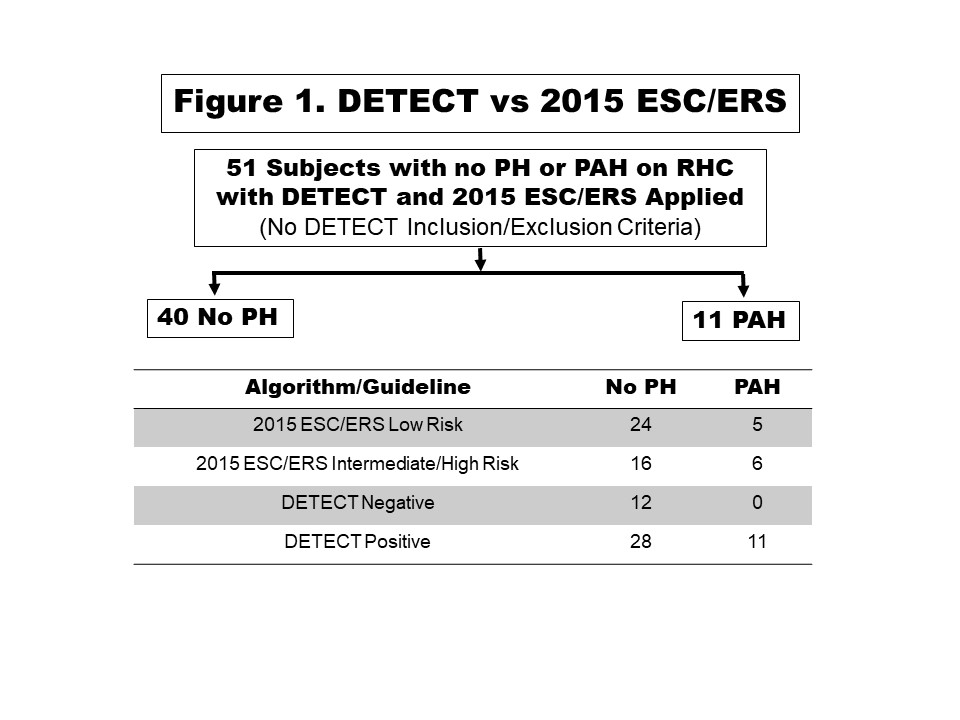Session Information
Session Type: ACR Poster Session B
Session Time: 9:00AM-11:00AM
Background/Purpose: Pulmonary arterial hypertension (PAH) is a leading cause of mortality in patients with systemic sclerosis (SSc). Active screening can detect SSc-PAH earlier and may improve survival. Various screening algorithms and guidelines are currently used. Our objective was to compare the DETECT evidence based screening algorithm to the 2015 ESC/ERS consensus based guidelines.
Methods: Subjects with a diagnosis of SSc based on the 2013 ACR/EULAR criteria who did not have a prior diagnosis of pulmonary hypertension (PH) and underwent a right heart catheterization (RHC) due to increased risk based on 2013 recommendations for screening and detection of connective tissue disease-PAH and/or DETECT were evaluated. Retrospective review of those subjects was performed to identify subjects who had variables available for calculation of DETECT and also echocardiographic imaging available for application of 2015 ESC/ERS.
Results: Fifty-one subjects had no PH (mPAP < 25mmHg) or PAH (mPAP ≥ 25mmHg, PCWP ≤ 15mmHg, PVR > 3 WU) based on RHC and had variables available for retrospective application of DETECT (without strict application of inclusion/exclusion criteria) and 2015 ESC/ERS guidelines. Eighty-two percent were female and 61% had limited cutaneous SSc. Mean (SD) age was 59.5 (12.9) years old, disease duration was 8.5 (8.1) years, FVC% predicted was 81.7 (18.0), DLCO % predicted was 53.1 (17.6), and FVC/DLCO was 1.70 (0.67). Forty subjects had no PH and 11 subjects had PAH. DETECT had 100% sensitivity and NPV whereas 2015 ESC/ERS had 54.5% sensitivity and 82.8% NPV as 5 subjects with PAH were missed (Figure 1). DETECT was able to detect PAH even in those with DLCO ≥ 60% (N=3).
Conclusion: Evidence based screening algorithms using composite measures and not just echocardiography alone improve screening for SSc-PAH. Although use of DLCO < 60% enriches the probability for SSc-PAH, subjects with SSc-PAH can have higher DLCO values. Although our sample size is small, it appears that DETECT performs well in those with DLCO ≥ 60%.
To cite this abstract in AMA style:
Young A, Moles VM, Nagaraja V, Vummidi D, Visovatti SH, McLaughlin V, Khanna D. Detect Outperforms Echocardiography Based Screening Guidelines for Early Detection of Systemic Sclerosis Associated Pulmonary Arterial Hypertension [abstract]. Arthritis Rheumatol. 2018; 70 (suppl 9). https://acrabstracts.org/abstract/detect-outperforms-echocardiography-based-screening-guidelines-for-early-detection-of-systemic-sclerosis-associated-pulmonary-arterial-hypertension/. Accessed .« Back to 2018 ACR/ARHP Annual Meeting
ACR Meeting Abstracts - https://acrabstracts.org/abstract/detect-outperforms-echocardiography-based-screening-guidelines-for-early-detection-of-systemic-sclerosis-associated-pulmonary-arterial-hypertension/

